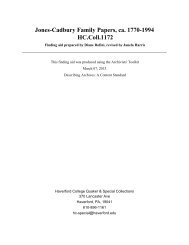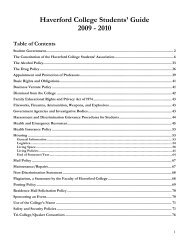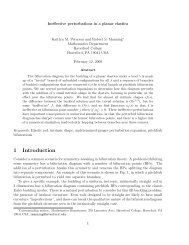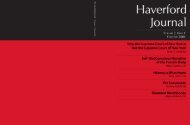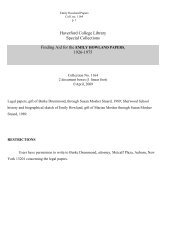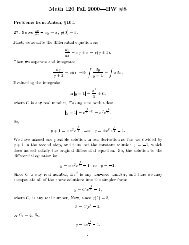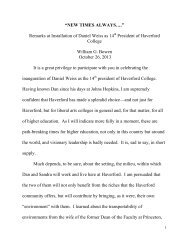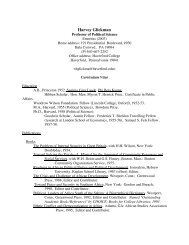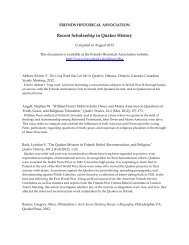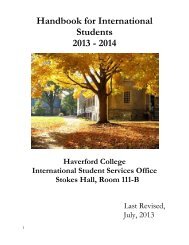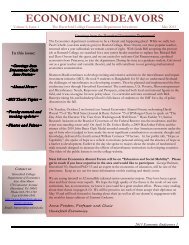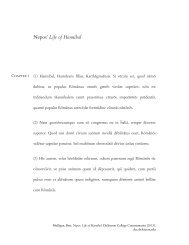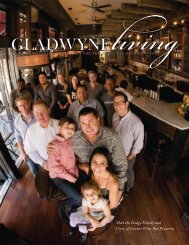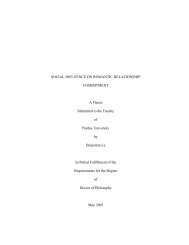Spring 2002 - Haverford College
Spring 2002 - Haverford College
Spring 2002 - Haverford College
Create successful ePaper yourself
Turn your PDF publications into a flip-book with our unique Google optimized e-Paper software.
Obituaries<br />
25 William Hinrichs, 97, died in his<br />
home in Meriden, Conn., on Friday, Jan.<br />
11, <strong>2002</strong>. Hinrichs received a doctorate<br />
from Columbia in 1929, going on to<br />
work as psychologist at the Connecticut<br />
School for Boys in Meriden. After World<br />
War II, he was employed as a professor of<br />
psychology at Georgia State University.<br />
He returned to Meriden in 1985 and volunteered<br />
at Miller Memorial Community<br />
and in the pharmacy at MidState Medical<br />
Center for 11 years. Hinrichs<br />
participated in many walkathons for<br />
multiple sclerosis. For several years, he<br />
was both the oldest walker and the oldest<br />
team captain in the nation. He<br />
received a gold medal for the 10K in the<br />
Senior Olympics. Hinrichs is survived<br />
by his daughter Ange and her husband<br />
Mohammed Islam, as well as numerous<br />
nieces and nephews.<br />
32 A. Keith Smiley died peacefully<br />
from natural causes on Thursday, Dec. 6,<br />
2001, at age 91, in Goshen, N.Y. Smiley’s<br />
lifelong involvement with Mohonk enterprises<br />
began upon his return from <strong>Haverford</strong>.<br />
In 1963, he and his brother Daniel<br />
were instrumental in founding the<br />
Mohonk Trust, now the Mohonk Preserve.<br />
In 1980, Smiley founded Mohonk<br />
Consultations, which sponsors programs<br />
that promote a broader understanding of<br />
the need for the sustainable use of the<br />
Earth’s resources. He authored several<br />
published essays on human interaction<br />
and the environment and was an early<br />
proponent of the idea that environmental<br />
degradation arises from regional and<br />
global problems. He dedicated himself to<br />
facilitating communication and understanding<br />
among different constituencies<br />
to find common ground for maintaining<br />
the health of the planet. A lifelong Quaker,<br />
Smiley was involved with the New<br />
York Yearly Meeting of the Religious Society<br />
of Friends and the Quaker United<br />
Nations Office. He was a member of the<br />
Board of Managers of the Oakwood<br />
School in Poughkeepsie, N.Y., from 1958-<br />
67, and served a term as Chairman. He<br />
also worked with Mid-Hudson Patterns<br />
for Progress. Smiley was honored in 1978<br />
with an Award of Merit from <strong>Haverford</strong><br />
<strong>College</strong> and the Quality of Life in the<br />
Hudson Valley Award from Mid-Hudson<br />
Patterns for Progress in 1992. He is survived<br />
by his wife of 61 years, Ruth Happel<br />
Smiley, his daughter Sandra, his son<br />
Albert, three grandsons, and three greatgrandchildren.<br />
34 Francis Hole, 88, died Tuesday,<br />
Jan. 15, <strong>2002</strong>. Hole received a B.S. from<br />
Earlham in 1933 in geology and biology,<br />
an M.A. in French from <strong>Haverford</strong>, and<br />
a Ph.D. in soil science and geography<br />
from the University of Wisconsin-Madison<br />
in 1943. He joined the faculty of UW<br />
in 1946 as an assistant professor of soils.<br />
He published widely and co-wrote a standard<br />
textbook, Soil Genesis and Classification<br />
(Iowa State University Press). He<br />
received the university’s distinguished<br />
teaching award in 1974. Hole retired in<br />
June 1983 but remained active in education.<br />
As an emeritus professor, he lectured<br />
to any interested audience, from<br />
preschoolers to academics to retirees,<br />
In Tribute<br />
Jonathan E. Rhoads ’28 of <strong>Haverford</strong> died<br />
January 3, <strong>2002</strong>. He was 94. Rhoads<br />
received his medical degree at Johns Hopkins<br />
in 1932 and then began his internship<br />
at the university hospital. He earned<br />
a D.Sc. degree from Penn’s Graduate<br />
School of Medicine in 1940. Dr. Rhoads<br />
joined <strong>Haverford</strong>’s Board of Managers in<br />
1948; he served as chair from 1963 to<br />
1972. He was awarded an honorary doctor<br />
of science degree from <strong>Haverford</strong> in<br />
1962. Throughout most of his career at<br />
the Hospital of the University of Pennsylvania<br />
and the university’s medical<br />
school, Rhoads focused his research on<br />
surgical patients’ nutrition. He first broke<br />
ground by concocting a mixture that, fed<br />
intravenously, made young animals grow<br />
normally to maturity and that kept children<br />
alive, despite bowel deformities that<br />
prevented them from processing food. In<br />
the 1950s, he served as university<br />
provost. Then, in the 1960s, he directed<br />
a research project that led to greater use<br />
of intravenous feeding, and his approaches<br />
came into common use. From 1935 to<br />
2001 he published nearly 400 papers.<br />
Many dealt with his findings about pancreatic,<br />
gastric, colon, breast, and liver<br />
cancers. He shed light on blood coagulation<br />
and the properties of vitamin K and<br />
on a common blood thinner. Early in his<br />
career, he was known for his expertise on<br />
shock and burns and published papers<br />
on those topics. He was among the first<br />
doctors to use sulfas, a family of drugs<br />
fighting bacterial infections, for burns<br />
and peritonitis. Rhoads worked at the<br />
university hospital for 70 years, starting<br />
as a junior physician in 1932. He was<br />
chairman of the university’s department<br />
of surgery from 1959 to 1972 and<br />
Jonathan E. Rhoads ’28<br />
remained an active member of the medical<br />
school faculty until his final hospitalization.<br />
He was a past president of the<br />
American Cancer Society, whose medical<br />
journal, Cancer, he edited for two decades.<br />
Rhoads is survived by his wife Katherine,<br />
daughter Margaret Kendon, sons<br />
Jonathan, George, Edward, Philip, and<br />
Charles, twelve grandchildren, and five<br />
great-grandchildren.<br />
48 <strong>Haverford</strong> Magazine



